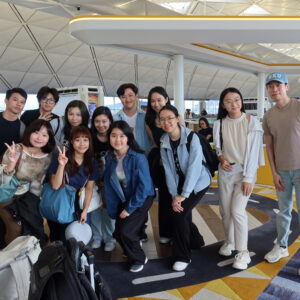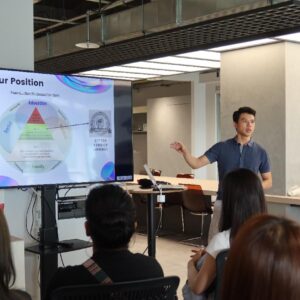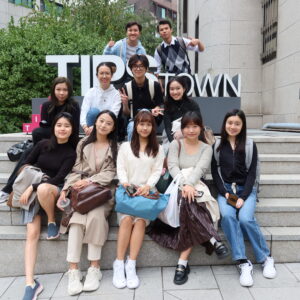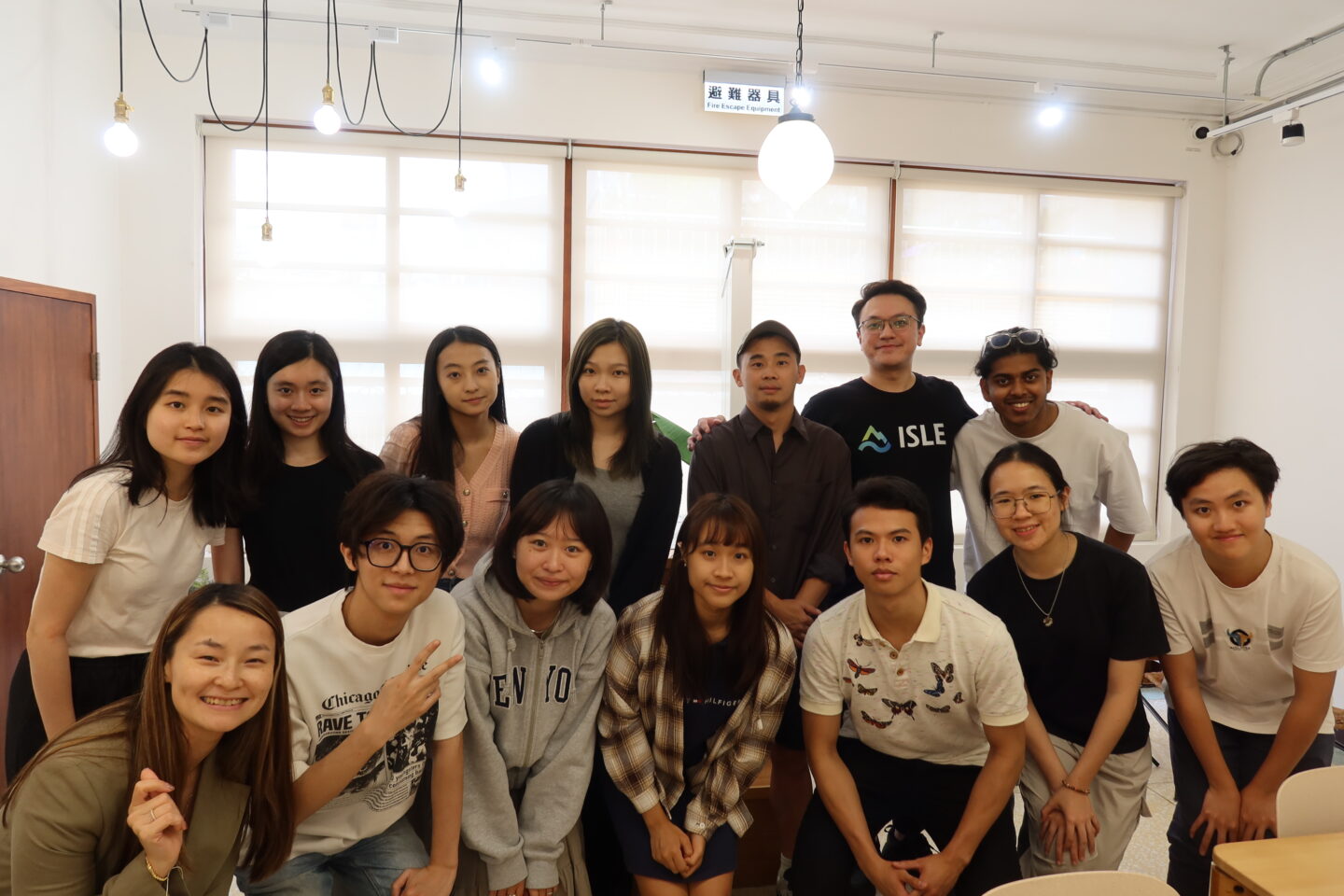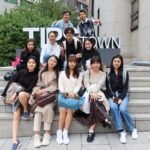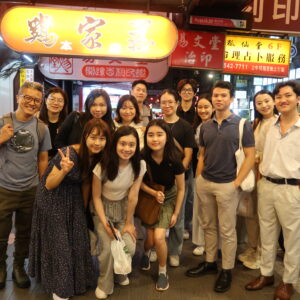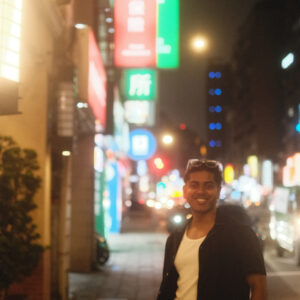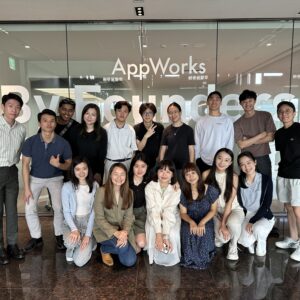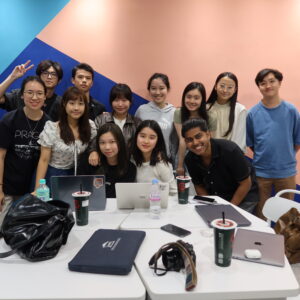Retrospecting our study tour together in Seoul and Taipei brought my memories back to the very first lesson of the course when I walked into a classroom where my peers had already acquainted or even established friendships with one another. The study tour will just be an overseas trip with educational lectures, visits, and working sessions. Similar to a business trip perhaps, or so I thought.
The first day in Seoul has proved me wrong. While waiting for our flight together at the airport, instead of talking among themselves, my peers kept me engaged in their conversations, establishing a cheerful start to the tour. Our first dinner together also paid attention to my dietary needs. Although I did not really enjoy the tofu kimchi pot I had (it was the only vegan option in the restaurant. Since I do not usually have such spicy food, my stomach felt uncomfortable afterward), I am grateful for how my Gini voiced my dietary needs, and even took the initiative in managing our transportation logistics.
My roommate, Venus, was more than simply a coursemate sharing a room. I would now address her as a true friend and a good listener. I had no difficulty opening up, telling her I wanted to eat something else for dinner. The following two nights, she decided to accompany me to restaurants where I could have more options, including a fully vegan restaurant! I enjoyed the meal very much, not only because I had plenty of choices on the menu, but much more importantly, seeing how I was viewed more than a person using the same room. During the two days, I often felt like a nuisance to her and the group, but Venus has always expressed how much she valued the one-on-one time spent together, which I also did.
I will also never forget how Sharon dedicated her time to accompany me to the telecom company when my SIM card did not function in Taipei. If it were not for her patience and time, I would not have the chance to enjoy exploring the city worry-free.
Of course, there were aspects of the tour that resembled my expectations. Just as I imagined them to be, the technology-related lectures given at the universities and founders of Web3-related businesses were highly technical and full of jargon that was extremely challenging to comprehend. In contrast to the insightful questions raised by my peers, I struggled with complete confusion, revealing the vast knowledge gap I needed to bridge for the remainder of this course. I was also unsurprised when comparing the disparities of the Web3 and startup landscapes in Seoul and Taipei to those of Hong Kong. In my opinion, the lecture on utilizing Web3 in vaccination programs has showcased the integration of Web3 into public services, an approach not widely observed in Hong Kong. As suggested by our visits to the local startup incubators DCamp and AppWorks, Seoul and Taipei appeared to be more advanced in nurturing startup ecosystems, with Hong Kong relying more on academic and governmental incubators, while Seoul and Taiwan offered more opportunities in the private sector. Nevertheless, I also noticed that STEM-focused startups were a shared emphasis for entrepreneurship support within the three cities. Such a developmental trend worries me as an undergraduate with limited expertise in related fields.
Simultaneously, the lectures also challenged my preconceptions about Web3 and entrepreneurship. Witnessing sharings from speakers of non-STEM backgrounds excel in Web3-related fields shattered my belief that a technical or engineering background was a prerequisite. I also realized that entrepreneurship does not rely on marketing or tech prowess. Broadening my perspective on the field, I see more possibilities for transforming our AI Human for dementia care into an actual project that can drive positive change.
Fortunately, some sessions piqued more of my interest. As a student with an environmental science minor, I resonated with the presentation by Dr Chan on the intersection between virtual reality (VR) and climate change mitigation, two fields that I never thought would be interconnected. Despite having taken various courses within the environmental sciences, complacency towards climate awareness has been rarely discussed, not to mention considering the use of VR in climate change education, opening a brand new academic perspective that enabled me to join my pre-existing dots of psychology and environmental science. While being aware of the ‘complacency trap’ as mentioned in the sharing, I was also reminded of how fortunate I am to live in a place protected from most natural disasters, including those intensified by a warming climate. The lecture delving into the application of generative artificial intelligence and VR in precision medical education also guided me to rethink the education systems ingrained in society. What exactly is the definition of precision education? Does it mean transferring the ‘right’ knowledge the collective society needs? Or rather, know-how catered to unique abilities, talents, and interests? Our discussion on tailored education in designing assignments and examinations — particularly within the medical context where human lives are at stake — was insightful, prompting thoughts of my education throughout the years and how ‘fairness’ and individual attributes could be conceptualized and embraced within education.
My favorite visit throughout our journey was the guided tour by 甘樂文創, in which I found myself engaged in the intersection of profit-making, social empowerment, cultural conservation, and environmental protection. I was surprised to see how a social enterprise could create a significant difference for multiple stakeholders concurrently — underprivileged youth and their families, the masters of traditional techniques, and the farmers of small farms. It was enlightening to see how individuals of such contrasting backgrounds could be together, empowered under a closely-knit network. From addressing intergenerational delinquency and poverty to preserving local facades and businesses, the work of 甘樂文創 transcends industry boundaries, impacting diverse sectors, including food, tourism, and education. With an academic interest in human ecology, seeing how the three pillars of sustainability manifest in reality was genuinely an inspiration. In addition, the emphasis on experiential learning over traditional lectures was personally meaningful, especially when we saw firsthand how a hospital was revitalized into a store processing and retailing soybean products, preserving cultural heritage and historical meaning embedded in the facility towards the surrounding community.
Apart from discovering my knowledge gaps in different cultural contexts, I realized I could work more efficiently than I thought as I handled assignments from other courses during the tour. The study trip proved to be a purposeful and fulfilling way to spend the reading week, offering a blend of education, culture, and self-exploration, and most importantly, the invaluable opportunity to understand and bond with my coursemates on a personal level. Here, I would like to end with a note of gratitude towards everyone who supported me intellectually and emotionally during the trip, as well as all those heartwarming memories created together.

